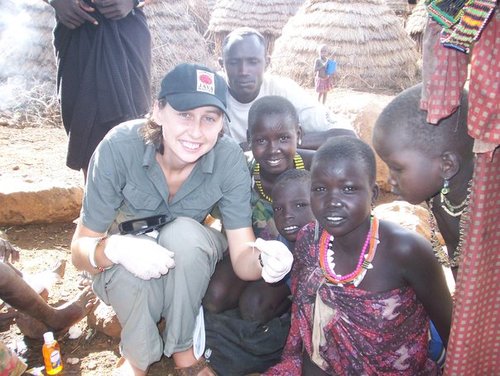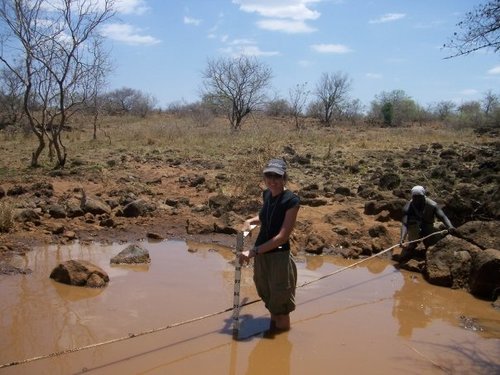Doctoral student Angelia Sanders named vice chair of ICTC [VIDEO]
Angelia Sanders, an MPH graduate of the USF College of Public Health and current DrPH student, said she wants her life legacy to be about helping others.
From her early beginnings with the U.S. Peace Corps working among rural communities in Kenya to address HIV, to her current focus on neglected tropical diseases with The Carter Center—a non-profit NGO based at Emory University that aims to advance peace and health globally—Sanders has close to 20 years of experience working on public health issues.
Currently as associate director for trachoma at The Carter Center, she assists the center by writing grant proposals and reports, monitoring spending and program activities and providing technical assistance to ministries of health and field staff.

It’s that passion, coupled with her extensive background on program delivery in resource-poor communities, that earned her the new title of vice chair of the International Coalition for Trachoma Control (ICTC)—a coalition of 50 NGOs, universities and donors working together to eliminate trachoma as a public health problem.
Trachoma is a bacterial eye infection found in communities lacking clean water and adequate sanitation.
According to The Carter Center, it’s spread through eye seeking flies and through contact with hands or clothes that have been exposed to the bacteria. Infection may also lead to blindness if left untreated.

“The [ICTC] has been a leader in harnessing the power of the collective, organizations and people with different passions and experiences and driving the elimination agenda,” Sanders said.
Sanders will serve as vice chair for two years, followed by two years as chair and another two years as immediate past chair.
“I appreciated that I was elected by representatives from these different organizations,” she said. “The fact that they recognized abilities within me to work with different groups of people and apply my practical experience to the big picture was very moving.”
In addition to earning her MPH from the COPH in 2008, where she also earned a graduate certificate in humanitarian assistance, she holds an MA in international studies from Old Dominion University and a BS in government administration from Christopher Newport University.
“My public health passion is identifying the people who have not been identified, that’s why I work in neglected tropical diseases,” she said. “There’s no reason people should be going blind and losing their limbs. These diseases are perpetuating the cycle of poverty; we know how to prevent that from happening, we need to make a stand and say these communities deserve more.”

After earning her MPH, Sanders spent 10 years in the field and decided to pursue an advanced degree.
“With public health and working abroad on these different diseases, I saw that there were aspects of graduate education that could help fill in the gaps of field experience,” she said.
She said the COPH’s DrPH program has helped her to do just that.
“For the DrPH program, your job is not to just be a student, your job is to go out there, make a difference in your communities, but use what you learn in the program in order to help you be better at your job,” she said. “I really appreciate that The Carter Center recognizes the importance of continuing education and it says a lot about USF that they are well respected and that both public and private entities are willing for their staff to take time and do this DrPH program.”
Upon graduating, Sanders said she hopes to expand upon her efforts in The Carter Center and its global eradiation efforts.
“Never stop learning,” Sanders said. “When one graduates, it’s not the time to stop looking at ways to become better. How can I apply what I’m learning to be better at my job? That’s what I’ll be asking myself.”
Story by Anna Mayor, USF College of Public Health
